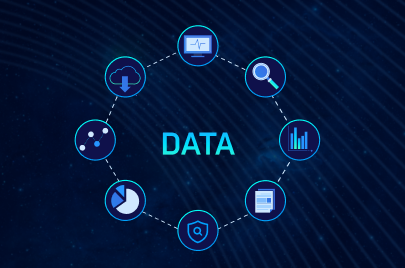Where do proxies run: 4 different types
20 June 2022
Proxies are set up in different places and based on different devices. Today we talk about what proxies are, why you might need them, how and where they are set up.
A proxy is a necessary component for:
- traffic arbitrage,
- software testing,
- parsing web data about competition,
- protecting your own brand,
- exploring SEO keywords,
- developing sites and social networks, etc.
Previously, we talked about features of proxies that are important to be successful on the Internet. Today we talk about types that proxies can be divided into according to the location and type of equipment they operate.
What is a proxy?
A proxy server is a device that passes through all data that you send to the Internet. Any proxy accepts requests and sends it further but already on its own behalf. More precisely, it uses its own IP address. The destination web resource receives the request and sends a response back. It returns through the proxy server to the sender.
So renting a proxy means borrowing a third-party IP address and gaining new opportunities associated with it, such as:
- an increased level of anonymity, since the proxy hides the real user’s IP
- change of geolocation. Geo targeted proxies may work in another city, country, or at least in another subnet, since they belong to another provider
- a possibility to launch automated bots, which collect data, monitor prices and availability of goods, search for the most popular queries in Google, etc.
- setting up a filter for sent and incoming requests. Proxy then opens (and closes) access to certain sites, or caches the content to load it faster next time. Big commercial structures also distribute traffic between servers.
The base principle of operation is the same for all proxies. But there are many reasons for classification. One of them is the physical location of the proxy and the device on which it operates. Every type below has pros and cons affecting its application.
Types of proxies
There are:
- datacenter proxies,
- resident proxies,
- mobile proxies,
- static residential proxies (ISP).
1. Datacenter proxies
Datacenter proxies are based in large data centers, hence the second name, datacenter proxies. A data center is a corporate building with network and server equipment inside. Such a cluster has a high-speed broadband connection to the Internet and operates a great bandwidth. Therefore, the best datacenter proxies provide a low ping and high uptime connection to the Internet.
Maintenance of datacenter proxies is inexpensive per unit due to the scope and number of them running in one place. They are supervised by a crew of professional engineers and technicians, so the performance of datacenter proxies is high.
The best datacenter proxies allow users to send multiple requests at the same time. It is a reason for an IP to be flagged or even getting banned by websites. Internet pages usually denounce this type of proxies quickly. That’s because of ASN (an Autonomous System Number). It is a unique identifier that all networks and subnetworks have. Websites check an ASN, determine it as belonging to a proxy, and restrict access or ask to solve a captcha. Even trusted proxy websites are vulnerable.
It turns out that such proxies are fast, reliable, inexpensive, but not well-protected from blocking. Therefore, they are poorly suited for well-guarded websites such as Facebook or Google, but are indispensable for SEO optimization, market analytics, web data scraping, and running sneaker bots.
Datacenter proxies are more profitable to buy than residential and mobile proxies, if you don’t need to bypass complex site protection but should run two or more fast bots or connections simultaneously.
2. Residential proxies
Residential proxies are better adapted to bypass restrictions. When you buy residential IP, you get an IP that belongs to one of the domestic service providers. These are usual PCs, Macs, smartphones etc. in households all over the world. These devices are connected to the Internet via Wi-Fi or a network cable.
Residential proxies have particular geolocation (e.g., the home address where the device is situated). Therefore, when you buy geo-targeted proxies, you become an ordinary local Internet user from the point of view of the web services. The risk of getting an IP ban is lower than for the datacenter proxies, even the best ones.
You can manage accounts in social networks, trading platforms or search engines through residential proxies. The data collected through residential proxies is relevant, since the parsing takes place in a specific region.
All trusted proxy websites have higher fares for residential proxies (compared to datacenter proxies). Another point is that these proxies are less sustainable. Because all such proxies at households could be randomly disconnected from the Web, and then turnt on again.
This instability is easily solved by using rotating proxies.You buy residential IP, and get access to the whole pool of such addresses. The rotating proxy server switches from one IP to another at time intervals, on click, or every time a new connection is established. It is safe for anonymity, if all new IP addresses have the same geolocation, and even better, the same ISP (Internet Service Provider). That’s how Astro works. We serve dynamic proxies when you buy residential IP, datacenter IP, or mobile proxy.
3. Mobile proxies
Mobile proxy is a more reliable version of residential proxy. These are smartphones, laptops, modems and tablets which act as online intermediaries with a connection to mobile operators.
Mobile proxies share an external IP with hundreds of other mobile devices. This is how the network is arranged due to the fact that there are not enough IPv4 addresses for all. It is called NAT technology, and is available when you buy not only mobile, but also residential proxies.
It makes other Internet servers and anti-fraud filters more tolerant to active proxy actions of mobile proxy users. Imagine that Google (or Meta) detects a mobile IP sending thousands of requests. The service bans it, and hundreds of innocent regular people who have been using the same IP, are now offline. That’s why Internet sites try not to apply any sanctions to the mobile proxies.
Mobile proxies are dynamic by default, and they are constantly changing IPs. They are used to work with multiple accounts of stores or social networks, as well as to check performance of a new software, or to access the most secured sites. All you need is to get proxies for a reasonable price from trusted proxy websites.
4. Static residential proxies (ISPs)
The type of ISP proxy has appeared recently. It is a server proxy, but with cons of a residential proxy. ISP proxies are physically installed in data centers, but registered as the IP addresses of domestic devices. That’s why every ISP proxy has low ping and high uptime, like server proxy. And shows a resistance to bans and captchas at the level of residential proxies… in theory.
The disadvantage of static residential proxies is the imperfection of the technology. To increase their profits, proxy services purchase inexpensive IP addresses from regional providers with a small subnet. Anti-spam and anti-fraud filters quickly track all the IPs from the pool, flag them as server-sided, and ban them.
Renting an ISP proxy is useful when there is a high probability of being blacklisted. But changing the IP is restricted for any reason. For example, while managing social media account for a long time, or serving two or more online stores on the same web site. But these proxies aren’t as reliable as usual geo targeted proxies, and cost more.
Our proxies
Astro offers to buy residential and mobile proxies, and the best datacenter proxies. To choose the type that fits the most, we offer to get a free trial, and test our proxies for free with no limits on time or proxy quantity.
All our proxies are dynamic. You can change an external IP address whenever you want. It reduces the likelihood of getting banned, or disrupting a connection. That’s why our service is so all-around!



